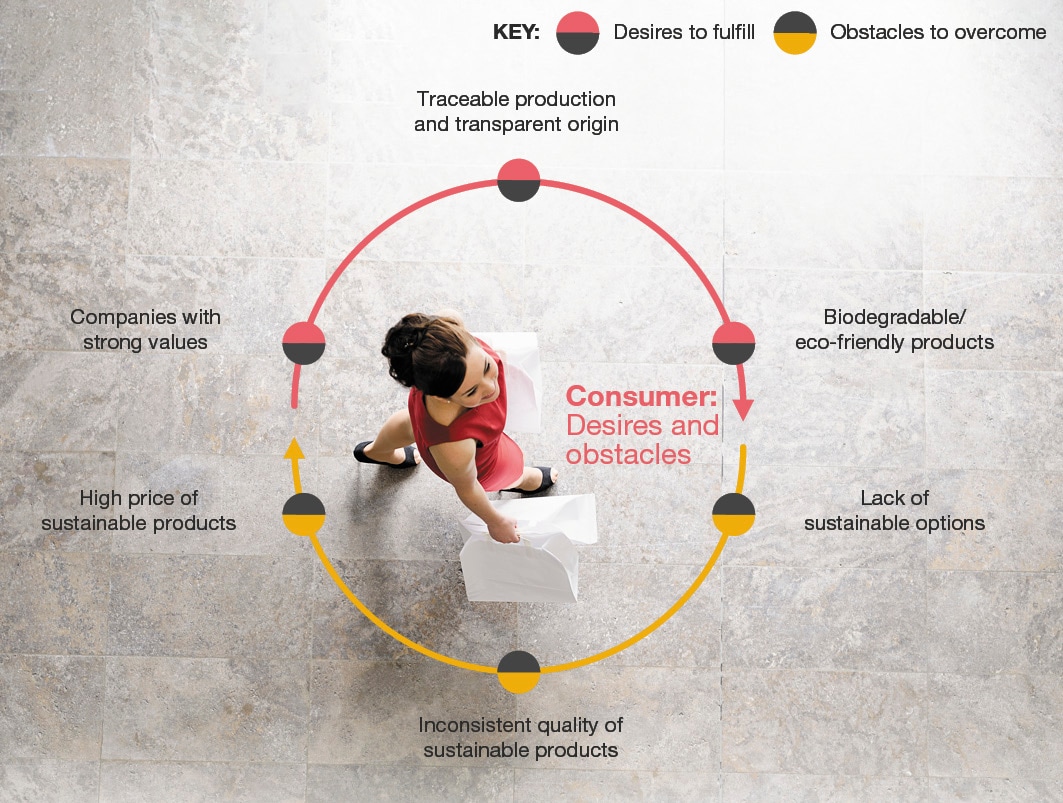
Many retail and consumer goods businesses often focus on the added costs and overlook value opportunities from the growing consumer demand for sustainability. In this report, we tap into consumer data from PwC’s Global Consumer Insights Survey to highlight consumer segments with the highest value potential, explore their desires around sustainability and the obstacles that keep them from making sustainable choices. Building on these insights we suggest targeted initiatives businesses can undertake to make sustainability a true source of value.

The COVID-19 pandemic has influenced consumer behaviour in many ways. One of the most notable is the desire to lead a more sustainable life. While not a new trend, our survey shows that sustainability has risen sharply and consumers now expect more from retail and consumer goods businesses.
The Sustainable Consumer
Only the young?
Sustainability is often associated with young city dwellers. However, while motivations differ, our survey shows the desire to lead sustainable lives is present across all generations.
Only the affluent?
It is not uncommon for sustainable products to have higher price tags and it is easy to conclude that sustainability is a luxury for the affluent. However, the desire to live sustainably in lower income bands is higher today than the overall average before the pandemic.
Obstacles & willingness to pay
An intention to purchase more sustainably across generations and income bands does not always translate into actual shopping behaviour. It is important to consider the limits to sustainable shopping, including too high prices and lack of sustainable options.

Value opportunities for businesses
Retail and consumer goods businesses that can help consumers support their desires to live more sustainable lives and help them overcome the perceived obstacles are in a good position to unlock the value of sustainability.
Our survey results show that Australian consumers have the desire to purchase from businesses with strong values, seek offerings with traceable production and transparent origin and products that are biodegradable and eco-friendly.
By fulfilling these desires, businesses can expect to benefit from an increase in sales. In the longer run, sustainable businesses can also benefit from significant indirect value, including benefits from an increase in consumer and employee satisfaction, avoided future costs (e.g. carbon emission tax) and improved access to capital from investors.
Initiatives business can take unlock value
Here are two case examples where companies in Australia and New Zealand are acting on consumer desires and obstacles. Our report explores these further and provides actionable initiatives your organisation can take.

Desire - Traceable production and transparent origin
Consistent with company values and associated business models, businesses should look to implement business practices that allow them to ensure traceability of production and transparency of origin.
Case example
A New Zealand-based clothing company provides transparency and traceability by allowing its consumers to trace each garment all the way back to the sheep stations where the merino fibre was originally grown. Customers can access photos and videos to see the living conditions of the animals that produced their wool, can meet the farmers, and track the entire production process.

Obstacle - High price of sustainable product
The most critical obstacle overcome is the perceived high prices of sustainable products.
Case example
A global consumer goods company has partnered with an Australian supermarket to enable customers to refill their existing empty laundry bottles in selected stores at a discounted price, reducing the barrier of higher prices for those who want to shop more sustainably. This not only reduces packaging, but it also limits spoilage and wastage.
Contact us
Donna Watt
Consulting Consumer & Industrial Products Lead, PwC Australia
Tel: +61 421 141 350
Brian Man
Partner, Customer Transformation and Retail and Consumer Industry Lead, PwC Australia
Tel: +61 400 441 188















